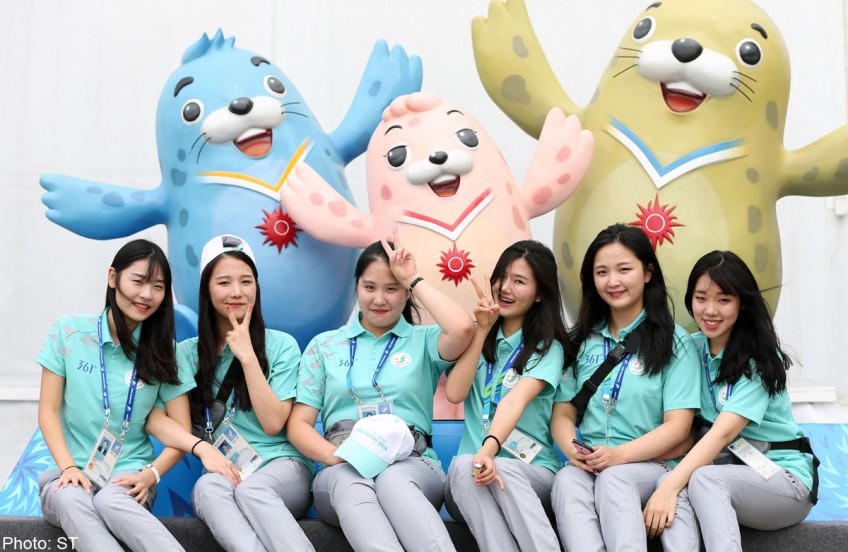National pride at stake in K-Asiad


As Singapore played Tajikistan in a near-empty Ansan Wa Stadium on Sunday, sitting alone in one section of the stands was a man in a black Polo T-shirt. His eyes remained locked on the action unfolding before him, even though he was eatinga bowl of Korean noodles.
Jang Yeol Roh speaks neither English nor Tajik. He cannot name a player on either team, and has not been to either country, but there he was, part of a crowd of less than 200 in a 35,000-seat venue, cheering on Singapore - who he claimed were the better team despite the late 0-1 loss - and watching a match that produced a solitary goal in 90 minutes.
The 49-year-old engineer admitted he was disappointed with the turnout, but, with a glint in his eyes, added: "I'm still proud that we are hosting the Asian Games. The event brings the whole country together. Thanks to the event, South Koreans are happier and communicate more positively with each other."
That appears to be what many South Koreans are feeling about the Asiad, a meet they are hosting for the third time, after holding it in Seoul (1986) and Busan (2002). Only Thailand have hosted the Games more times (1966, 1970, 1978, 1998).
Kim Jae Bok, a student at Hallym University and volunteer liaison officer at the Games, agreed. She said: "Of course we're excited. It's a big international festival, and I'm really happy it's back.
"I also feel proud as a Korean, because it's never easy to hold the biggest sporting event in Asia."
Vietnam's decision in April this year to withdraw as 2019 hosts may have highlighted the high cost of organising the Games, coupled with the relatively mediocre tourism revenue it generates.
Regardless, South Korea have spent a reported US$1.62 billion ($2.05 billion) on the Games, including building 16 new competition venues.
A look at the line-up of high-profile performers for Friday's opening ceremony tells the story.
The likes of Gangnam Style singer Psy, pop group JYJ, and Chinese pianist Lang Lang, among others, will all perform.
The organising committee has also mobilised over 13,500 volunteers from all over the country to support a meet which will feature some 13,000 athletes in total.
Having invested so much, expectations are naturally high.
China are still untouchable at the top of the medal table, but South Korea chef de mission Park Soon Ho called on the 831-strong contingent to break the 90-gold barrier, a feat they have achieved each time they hosted the Games.
Shooting, archery, swimming, baseball and badminton are sports tipped to deliver medals for the host nation, who have finished second in the medal table for the last four editions.
The shooters, with four golds and two silvers so far at the ongoing ISSF World Championships in Spain, are led by newly-crowned double world champion (10m air pistol and 50m pistol) and three-time Olympic gold medallist Jin Jong Oh, and should at least match their 13-gold haul at the last Asiad.
Olympic gold medallist swimmer Park Tae Hwan is also under pressure to retain his Asian Games crown in the 100m, 200m, and 400m freestyle, although he will be challenged all the way by China's Sun Yang.
Their footballers got off to a good start last Sunday. The men's team beat Malaysia 3-0 in a packed Munhak Stadium, while the women trounced Thailand 5-0.
Far removed from the arena is the hope that the Games will improve bilateral relations with neighbours North Korea.
Some of the 273-member delegation from the North have already arrived, with more expected before the opening ceremony.
Things did not get off to a good start, with national flags of all 45 participating countries taken down and replaced by flags of the Olympic Council of Asia and the logo of the Games, following local protests against the display of North Korea flags.
Locals were also reminded by authorities last Friday that it is illegal to take the North Korean flag into stadiums. In addition, the two countries will not march under the Korean unification flag at the opening ceremony.
This comes on top of North Korea's decision last month to withdraw its 350-strong cheerleader squad from the Games, after citing "abusing sacred sports and cultural exchange" for a "sinister political purpose".
Nevertheless, some hold out hope that the universality of sports can transcend politics.
Lee Jun Min, a service staff member in the athletes' village, said: "A few days ago I met some North Koreans when I was delivering office supplies and furniture to their unit.
"They were kind, friendly, and easy to talk to.
"Sports is a good way to bring people together, and I hope after the Asian Games, the relations between both countries will be better."
Dongguk University student Ryu Ha Eun, a volunteer at the event, said: "We have been given a special advisory on how to interact with the North Koreans. It's basically about not being rude, showing them deference, and also being cautious.
"It's weird because they speak like us, look like us, yet there's just some kind of gap. I know the relationship between both countries is not that great, but I'd still like to be friends with them."
Lee Si Hyung, who works in the athletes' village dining hall, said: " One of the draws of a sporting meet is that athletes from different countries come together to compete and celebrate.
"I'm absolutely fine with the North Koreans coming. They are our brothers and sisters."
siangyee@sph.com.sg

This article was first published on Sept 16, 2014.
Get a copy of The Straits Times or go to straitstimes.com for more stories.